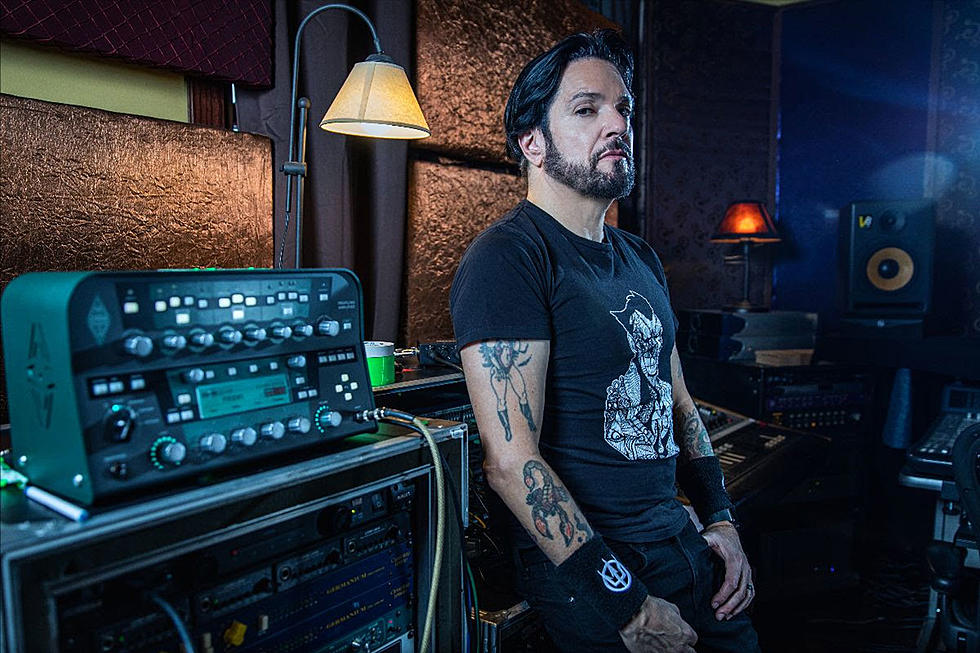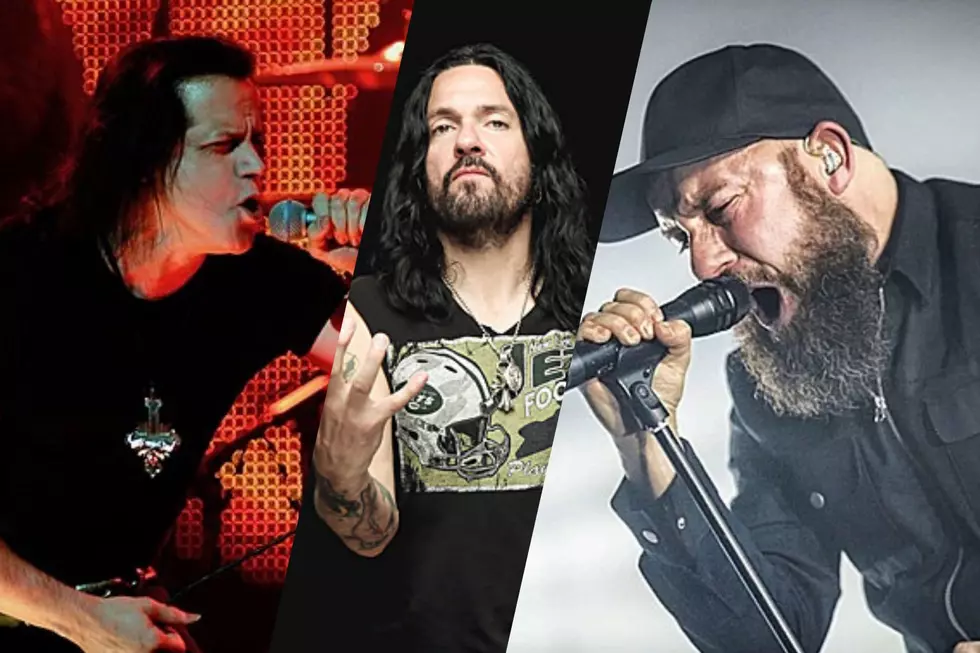
Prong’s Tommy Victor Names His Favorite Metal Album of All-Time
Prong leader Tommy Victor was the guest on this weekend's Full Metal Jackie radio show, with the musicians dropping by to discuss the band's latest album, State of Emergency.
Victor offers us insight on how his move to the East Coast impacted the mood of his new album, and how revisiting the music of his youth served as inspiration on State of Emergency. He serves up some of those early metal influences, including the metal album he calls his favorite of all-time.
We also check out the new song "The Descent," as well as the Prong's cover of Rush's "Working Man," and Tommy also shares some what he feels fuels young musicians to pick up an instrument for the first time. Check out the chat in full below.
We've got Tommy Victor from Prong. How are you?
Oh, I'm great Jackie. Thank you so much for having me on the show, it's always amazing. You've always been great, and I really appreciate this.
Thank you so much, FYI I didn't even have to pay Tommy to say that. Such kind words! So you've got a great new record called State of Emergency and Tommy, one of the key things for you of late has been a move back to the East Coast. Can you talk about how the change of scenery back to Amityville impacted the feel and direction of what you wanted to do on this new album?
Yeah, the weather change being one; when I moved it was in the midst of a snowstorm. So after being in L.A. for all those years, I'm like, "Wow, okay, this is amazing." I was just walking through slush and being rained upon for a couple of months and that had an effect on it, and also I moved pretty close to where I grew up in Queens.
Just looking at the sky and the time of year I was like, "Wow, what was I listening to when I was 13?" I pulled out Volume Four again and the first Rush record, and then Zeppelin III and I just got that vibe of “this is why I started playing.” I had this, as it's really in its look inexplicable, this gloomy, doomy feeling and I liked it.
I mean I was like this depressed kid but now I appreciate it, like this is why I picked up the guitar, and in reaction to this again this inexplicable feeling, with the gray skies and Sabbath and Queens, and you know, the dreariness of it all.
Tommy, one of the great new songs on the new record is called "The Descent." It's about the invasive nature of media in today's society. Taking a step back and analyzing where we are now, what have you noticed in how things have changed over, say, the past decade and how we communicate with one another?
The attachment to smartphones being one, and I think everyone is experiencing this now, the strangeness of when you're talking to somebody and then suddenly you get blasted with an ad, like, "Oh, yeah, like, you know, baby cribs, we need a new one," because then you get an ad, you know, in the next second. So that being the feeling that we are almost dangerously connected to a big brother of some sort that's watching us.
And I didn't think we felt that. I mean, as a kid, there was this mythos of a big brother and the possibility of that happening based on George Orwell's books and now we're really experiencing it, where it's a total intervention of this strange media source or this eye that's watching us all the time and giving us information.
And with the Apple news, like on an iPhone, you're getting blasted with that stuff too. So our lives are becoming more isolated yet in a singularity towards everybody else at the same time. So it's strange, especially for somebody that remembers when we didn't even have cell phones and now we're in this era of being attached to them and now being fed all this information.
And then the comparative nature of that too, where, you know, years ago, it was difficult to really compare yourself to others now. Like, if you look at social media, I was like, "Oh, this person's life is so great," and, you know, like, "my life is not as good as them and I feel inadequate," and I think that people are getting a certain feeling of inadequacy and rejection goes to that.
And that's part of what the lyric is about too. This guy's just in this spiral, this downward spiral. And his descent into madness is paralleled with society in general, just everything just going downhill. So it's a little bit dystopian and dark.
Prong, "The Descent"
Tommy, I know this album has been a labor of love for you. In a recent interview, you spoke about going back and revisiting some of the riffs that initially inspired you musically and what made them great. Who are some of those artists that inspired you while you were working on this album? And what about the period of time these riffs came from stood out to you?
Yeah, sort of what I was referring to earlier where as early 70’s is where I really got into music and was in my basement just collecting records and going through anything that was heavy back in those days. it's funny when you think of what we called metal, which is Deep Purple, Sabbath, maybe Zeppelin.
Then we had the intervention of North American bands, which was like Montrose, then Rush, Nugent, right? So anything from let's go with "Cat Scratch Fever" or "Stranglehold" to "Working Man," to "My Woman From Tokyo" and "Smoke on the Water" and anything off of Volume Four - "Tomorrow's Dream" and "Wheels of Confusion" you know, "Under the Sun," those are the classic Sabbath songs to me and that record was, oh man, that's probably my favorite record of all time is Volume Four. So, yeah, I was listening to that. I have a young boy and he loves it. I mean, we would jam in that and we dig that one a lot.
Tommy, I couldn't help but notice there's a cover of Rush's "Working Man" on here. Such a great band with a lot of amazing material to choose from. Was it hard to narrow down which Rush song you wanted to cover? Or was there a particular reason why "Working Man" was the easy choice for you?
The lyric being the main thing, where in an era where you had Zeppelin with their Celtic Tolkien themes and Viking themes, Deep Purple, mainly chicks and cars and Sabbath with the religious Satanic, anti -Satanic and drug war themes. And then Rush had 'Working Man,' it was just this blue collar anthem. So, I always liked that.
It was so direct and I thought that corresponded to where the lyrics were on this record, on the Prong songs, where they were trying to be direct and really blue collar-oriented where the average guy, again with the guy in "The Descent," it's an average guy on his phone, and now suddenly feeling like his life is lost. And you know, there's a song "Breaking Point" too, it's just the general populace is being frustrated and this guy's frustrated.
He's just working his jobs, having a couple of beers and with his life going, what am I doing? So, I was intrigued by that and then the riff is a classic riff. So those are the two main elements of it. That first Rush record, it's like an early stoner doom record and I love the rest of them up to Hemispheres. But that one, when I first got it, I read about it in Circus Magazine, went out and bought it and I remember putting it on, I'm like, "Wow, these guys are so heavy, this is like the coolest thing in the world."
So like I said earlier, anything that was heavy, that was what I was intrigued by. And it was hard to find back then. I mean, "Working Man" was one of the heaviest riffs around at that time and it's amazing to think of it now. But I mean, tune down to C -Sharp, Tony Iommi tuning, like I did on the State of Emergency record. It still sounds pretty brutal. So people gotta check it out, I'm really happy the way it came out.
Prong, "Working Man"
Tommy, everyone has to start somewhere. Obviously a lot has changed in the music world since you started, but would there be a piece of advice you'd offer to someone who's just decided they're ready to pick up an instrument and play? Like what drove you in those early days and what keeps you coming back?
I think the main thing about starting to play is a general anger or a displeasure with society and where you are. And I think you need to have that a little bit in order to get on an instrument and dedicate all those hours to it. If you're too happy about the way things are, I don't know what you're gonna do. Like you're just gonna drive your father's BMW or something.
So I think being a poor kid, or frugality or something's gotta drive you to that. And I mean, either you have it or you don't. I mean, you pick it up within a year, you should be able to figure out if you got it or not. And then, you know, I would say join a band, play with people and see if you want to keep going with it. But with me, it was just being, not feeling like I fit in.
I was like a 270 hitter in Little League. So sports wasn't really [my thing]. It's not that I didn't play. And I was an okay basketball player. My grades were okay. I was never really that successful with chicks. So what am I going to do? I want to play in a band. So that's where it started with me, just a reaction to my social environs. And again, growing up in Queens wasn't the easiest thing in the world, either. But my advice, if you feel it, do it, do it, have fun, you know?
READ MORE: 10 Best Groove Metal Albums as Chosen by Dagoba
Tommy, always so great to catch up with you. I just wish you the best of luck and really appreciate you checking in with us tonight.
Thank you so much, Jackie. I really appreciate your support.
Many thanks to Prong's Tommy Victor for the interview. You can pick up Prong's 'State of Emergency' album and merch here and stay up to date with touring here. You can also follow them on Facebook, X, Instagram and Spotify. Find out where you can hear Full Metal Jackie's weekend radio show here.
The 'Big 4' of 17 Metal Subgenres
Gallery Credit: Jordan Blum
More From Loudwire









